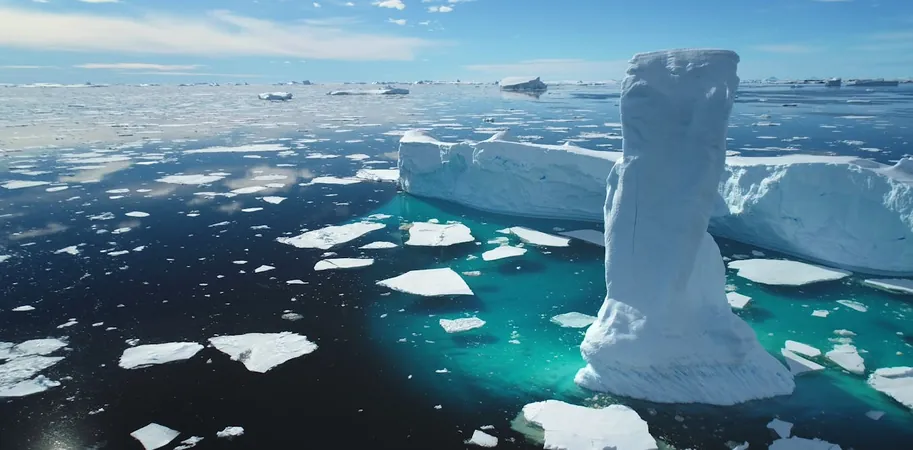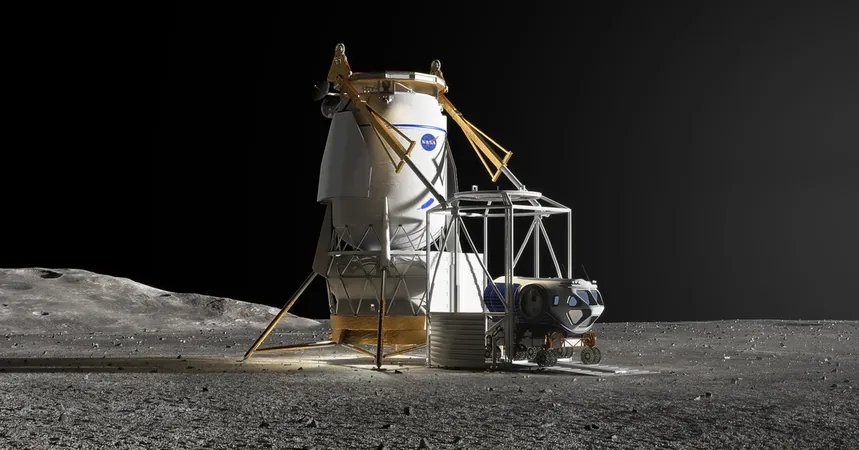
Greenland's Melting Ice is Shaking Up Our Oceans – Are We Running Out of Time?
2024-11-18
Author: Olivia
Greenland's Melting Ice is Shaking Up Our Oceans – Are We Running Out of Time?
A significant shift is underway in our planet's climate system, as the expansive network known as the 'great global ocean conveyor belt' slows down at an unprecedented rate. This critical ocean current system is fundamental for redistributing heat, affecting global temperatures and weather patterns.
Recent research reveals that the Atlantic Meridional Overturning Circulation (AMOC) is currently weaker than it has been in the last millennium, with potential links to global warming. Historically, this current has played a crucial role in maintaining climate stability and marine biodiversity by channeling warmth north through the Atlantic Ocean. However, concerns have risen as studies highlight that its weakening could dramatically reshape our climate and ecosystems.
The latest modelling indicates that if global temperatures rise by just 2°C, the AMOC might become up to 30% weaker compared to its strength 70 years ago. The implications? Southern regions may experience accelerated warming, European winters could become more severe, and the northern hemisphere's tropical monsoons could falter. Worse yet, these changes may manifest much sooner than previously anticipated.
Atlantic Observations and Future Implications
Monitoring of the Atlantic's circulation has been ongoing since 2004, but researchers acknowledge that historical data is needed to fully understand the dynamics at play. Sediment analysis suggests that this vital current is currently at its weakest point in a thousand years, having declined approximately 20% since the mid-20th century.
The world has already heated up by 1.5°C since the industrial revolution, and alarming trends show that this warming is escalating nearly four times faster in the Arctic region. The melting ice from Arctic glaciers and the Greenland ice sheet since 2002 has resulted in a staggering loss of 5,900 billion tonnes of ice – an amount so vast it could cover the whole state of New South Wales in ice more than eight meters thick!
This influx of freshwater into the subarctic ocean disrupts the overall density balance of seawater, preventing colder, saltier water from descending to the ocean's depths. Consequently, the southward flow of deep cold waters slows, which simultaneously weakens the Gulf Stream—the very mechanism that provides milder winters for regions like Britain.
Our recent collaboration in climate modelling is revealing that the meltwater from Greenland and Canadian glaciers is indeed a critical factor missed in earlier assessments. Adjusted simulations now align more closely with reality, reflecting the ongoing slowdown of ocean currents and signaling a future that's rapidly changing.
A Shocking Connection Between Oceans
New insights suggest that the North and South Atlantic oceans are more interconnected than previously thought. As the AMOC weakens, a phenomenon known as the 'warming hole' emerges in the North Atlantic, where surface temperatures rise significantly slower than in adjacent areas.
This disparity is leading to a concerning accumulation of heat and salinity in the South Atlantic, creating a ripple effect that alters conditions across the hemispheres. Remarkably, our simulations indicate that changes in the North Atlantic are felt in the South Atlantic in under 20 years—offering a new lens through which to view the profound implications of the AMOC’s slowdown.
What Lies Ahead?
Current climate projections warn that the AMOC could weaken by roughly 30% by the year 2060, but this estimation does not incorporate the anticipated contributions from melting glaciers. If we factor in these dynamics, the timeline accelerates, predicting a 30% reduction as early as 2040—20 years sooner than earlier forecasts.
Such changes will disrupt ecosystems globally, leading to harsher winters for Europe and drier conditions in the northern tropics. Meanwhile, regions in the southern hemisphere, including parts of Australia and southern South America, may experience hotter and wetter summers, altering local weather patterns and agricultural conditions.
As climate changes intensify, the urgency for action has never been greater. The more rapidly our ice sheets melt, the more swiftly our climate system could face irreversible disruptions. We are rapidly approaching a tipping point, and it’s imperative for humanity to take decisive steps to mitigate emissions now—or risk facing dire consequences in the very near future.
Conclusion
Are we prepared to confront the chaotic climate changes ahead, or will we be caught off guard? The time for action is now!









 Brasil (PT)
Brasil (PT)
 Canada (EN)
Canada (EN)
 Chile (ES)
Chile (ES)
 España (ES)
España (ES)
 France (FR)
France (FR)
 Hong Kong (EN)
Hong Kong (EN)
 Italia (IT)
Italia (IT)
 日本 (JA)
日本 (JA)
 Magyarország (HU)
Magyarország (HU)
 Norge (NO)
Norge (NO)
 Polska (PL)
Polska (PL)
 Schweiz (DE)
Schweiz (DE)
 Singapore (EN)
Singapore (EN)
 Sverige (SV)
Sverige (SV)
 Suomi (FI)
Suomi (FI)
 Türkiye (TR)
Türkiye (TR)